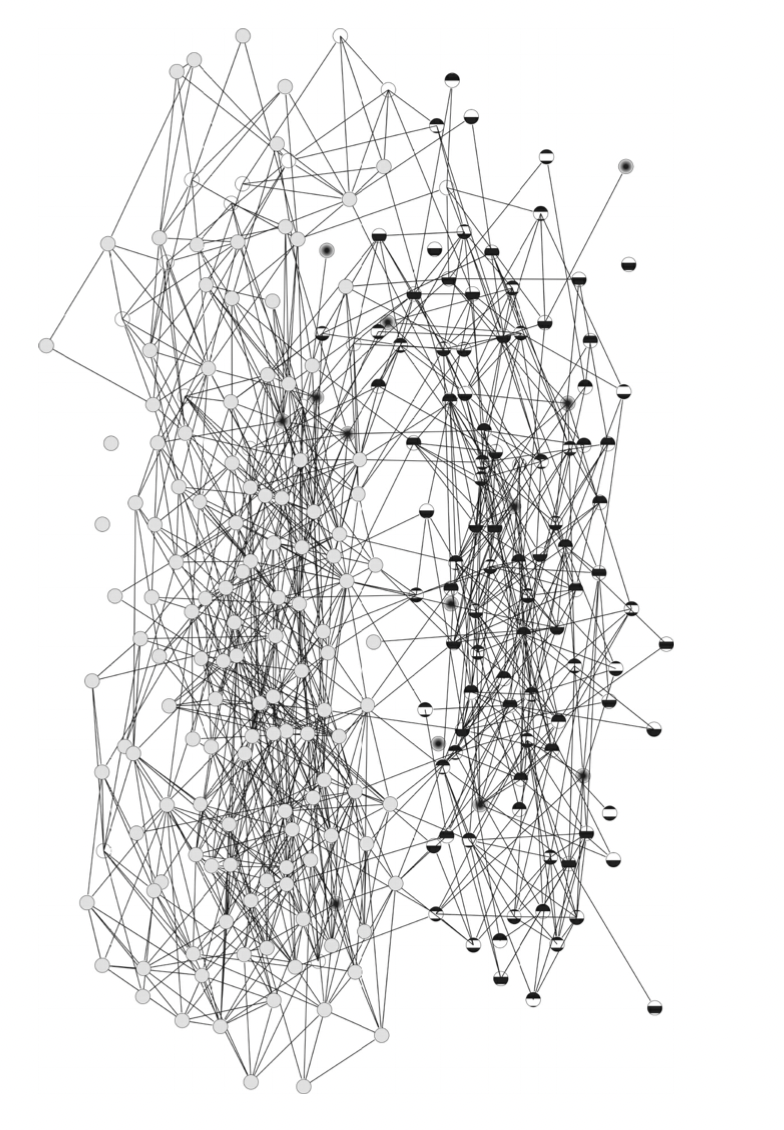 A network of High School friendships coloured by ethnicity from the book 'Social and Economic Networks' by Matthew Jackson.
A network of High School friendships coloured by ethnicity from the book 'Social and Economic Networks' by Matthew Jackson.
Research
My doctoral research focuses on complex learning, with a focus on human capital investment (read education) of young people. I use diverse econometric, algorithmic and experimental methods to analyse how students interact with themselves, systems and technology, and the economic implications of such actions. I am especially interested in the confluence of students’ peer networks, technological innovations and non-cognitive skills, and the study of these in resource-scarce settings, i.e. Low and Middle-Income Countries. Some of the applied work that I do happens in Mexico, my home country.
In collaboration with the International Labour Organisation, we revised and proposed a new framework with which to understand young people’s aspirations as determinants of their future economic outcomes, and complements to succesful employment policies. The paper, Youth aspirations and the future of work was jointly written with Drew Gardiner and Micheline Goedhuys.
In related work, I design a video-intervention to affect aspirations of high school students in Mexico. The Randomised Controlled Trial was carried out during the 2018-2019 school year, with 45 participating schools from the Midwestern region of Mexico. We show that low-cost technological interventions, paired with a social network-driven approach, are effective policy tools to decrease information asymmetries and optimise student-decision making, through their aspirations.
I am also interested in ethics, equity and redistribution. With Chinasa T. Okolo, we design an ethics and empathy driven approach to enable the use of Artificial Intelligence on patients in healthcare settings. You’ll find the most recent version in PDF format below. With Stefania Merone, Edwin Lock, and Simon Finster, we are currently working on understanding how exposure to self-interest & altruistic narratives and peer behaviour affects reource-rich country citizens’ willingness to donate to resource-poor countries, within the context of the COVID-19 pandemic and the Russo-Ukrainian war. You can find the pre-analysis plan for the first of two experiments online.
More recently, Ariel Procaccia, Evi Micha, Francisco Marmolejo, Edwin Lock, and Simon Finster and I developed an algorithmic mechanism to efficiently allocate scarce testing resources, thus allowing an institution to safely return to in-person activities after an epidemic. You can visit the web application for the COVID-19 Safe Education Framework for more details on the project. Alternatively, you can download the pre-analysis plan for the RCT, or visit the GitHub for the open source code for the web application. The paper Welfare-Maximizing Pooled Testing is available at arXiv.
Publications
Drew Gardiner, Micheline Goedhuys and Michelle González Amador.
International Labor Organization (ILO), 2021
Exemplary track paper award
Simon Finster, Michelle González Amador, Edwin Lock, Francisco Marmolejo-Cossío, Evi Micha, Ariel D. Procaccia.
24th ACM Conference on Economics and Computation, 2023
Working Papers
Michelle González Amador, Robin Cowan and Eleonora Nillesen.
working paper, 2021
Chinasa T. Okolo and Michelle González Amador.
working paper, 2023
Simon Finster, Michelle González Amador, Edwin Lock and Stefania Merone.
working paper, 2023